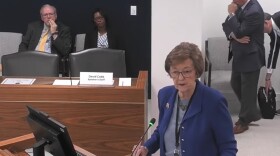This summer, North Carolina lawmakers unveiled controversial education proposals - like ending funding for driver's education, and slashing money for teacher assistant positions to pay for more teachers. After months of press conferences, closed-door negotiations and loud floor debates, lawmakers released details of their budget deal this week. Below are some of the K-12 education highlights:
Teacher Pay: This budget agreement raises the starting salary for first-year teachers from $33,000 to $35,000. It also gives "step" increases to some teachers, based on their experience. Teachers in their 5th, 10th, 15th and 25th years of service receive raises between $3,000 and $3,500. And, like all other state employees, all teachers get a $750 bonus.
TAs: The spending plan would keep funding for teaching assistants and includes increases for student growth. That means the state will set aside $377 million over the next two years for teacher assistants. But school districts would no longer be able to use that money for other needs, like hiring more teachers. Last year, more than 40 school districts redirected TA money from the state to other areas.
Prep Policy: The proposed budget also includes six pages of policy governing teacher preparation programs, including the requirement that students entering schools of education have a high school GPA of at least 2.7 and graduate their programs with a GPA of 3.0 or greater. The budget also sets out requirements for teachers who enter the profession by "lateral entry." These are professionals who become teachers but don't have a background in education. Lateral-entry teachers commit to becoming fully licensed within three years.
Private school vouchers: The proposed budget would expand opportunity scholarships by $14 million over the next two years to increase the number of low-income kids who can attend private schools. This summer, the N.C. Supreme Court ruled private school vouchers constitutional, which reversed a ruling last summer by a superior court judge.
Reading Camps: Lawmakers want to create reading camps for 1st and 2nd graders as part of the state's Read to Achieve initiative. Currently, the camps only target third graders who are reading below grade level.
Textbooks and Digital Resources: Legislators want to increase money for textbooks and digital resources over the next two years, bringing the total funding to $62 million. The budget proposal would also set aside $14 million so more classrooms have high-quality, reliable internet connectivity.
Transportation: The plan would reduce transportation costs by about five percent, "which reflects a lower projected cost for diesel fuel," according to the budget bill.
Driver's Education: The final budget proposal would fund driver's education. Previously, the senate's plan called for de-funding the program and moving it to the community colleges.
DPI Budget Cut: The proposed budget cuts funding for the Department of Public Instruction by 5.2 percent over two years.











